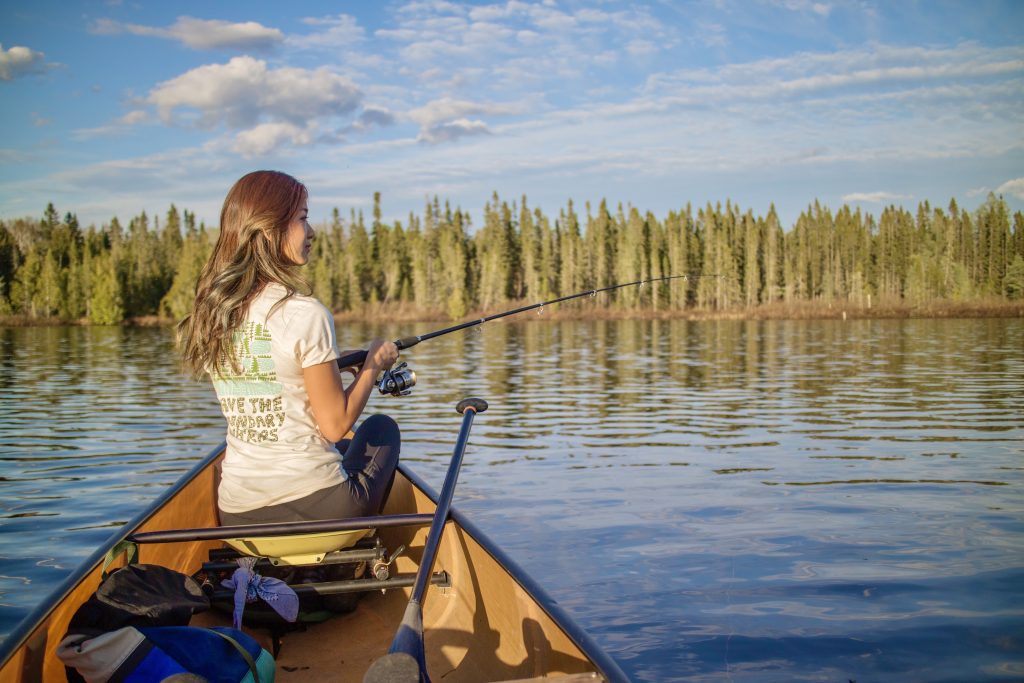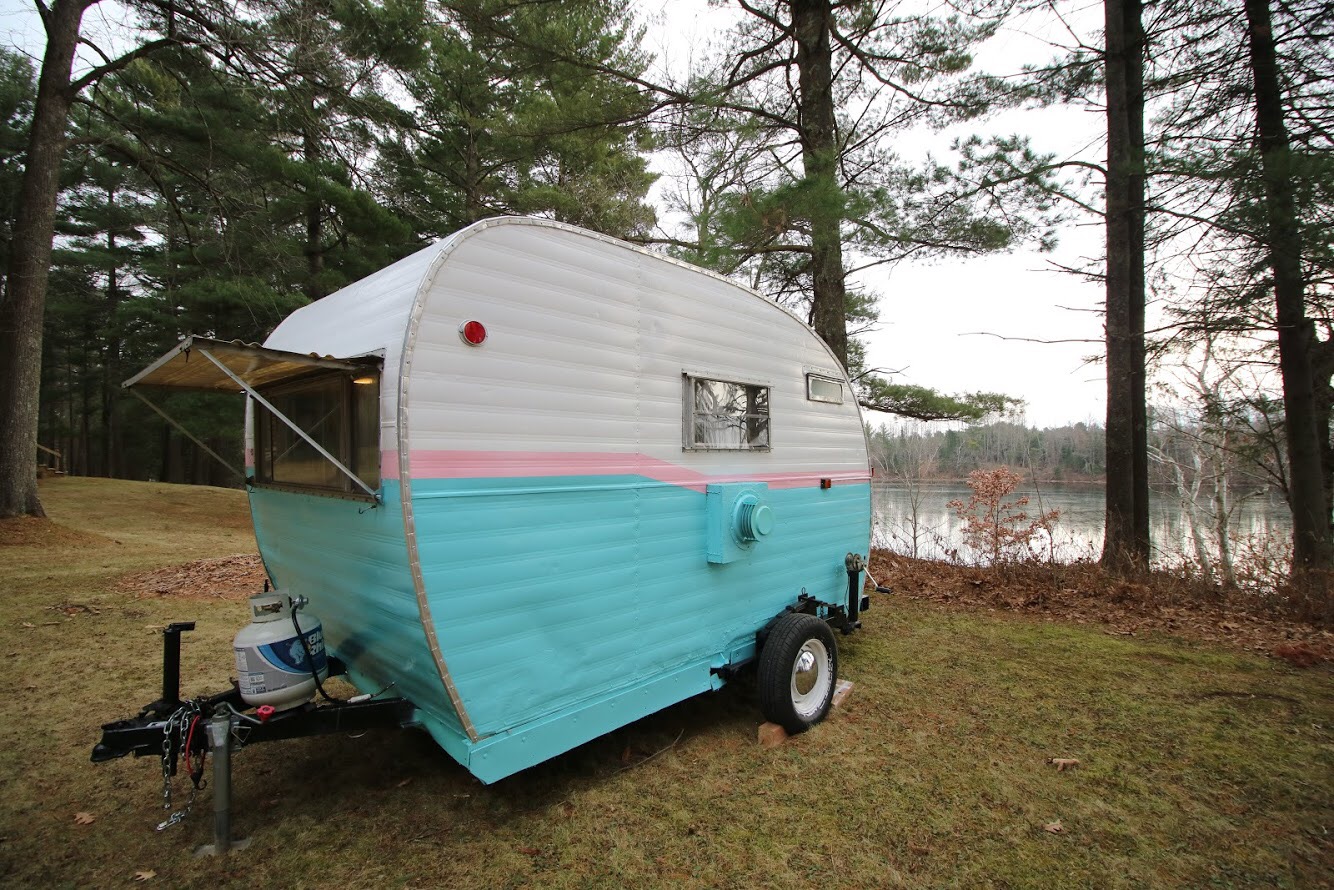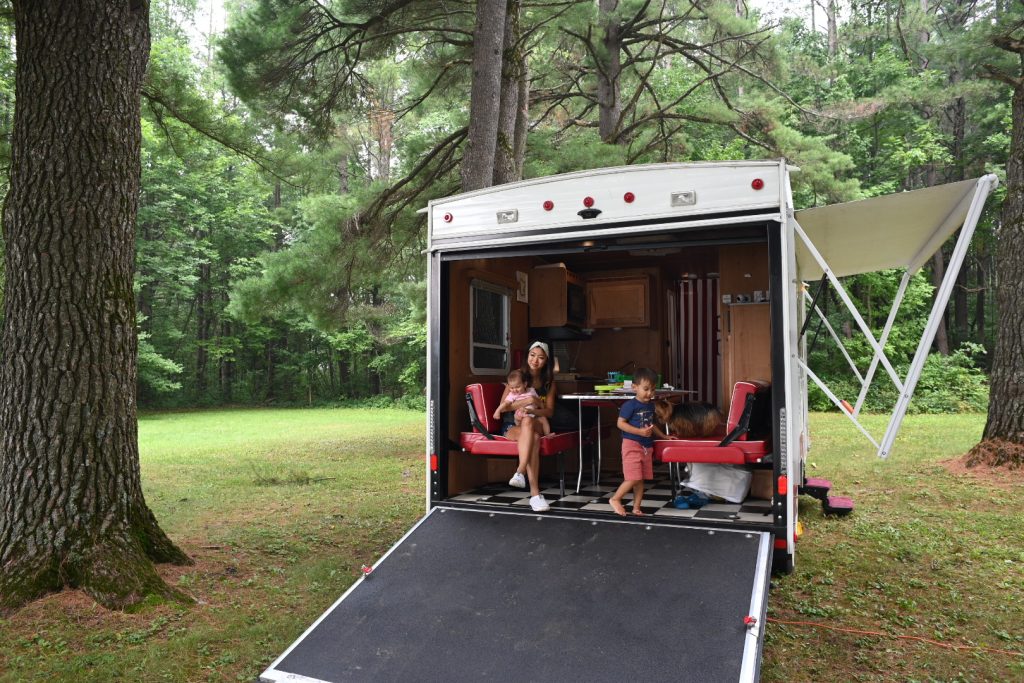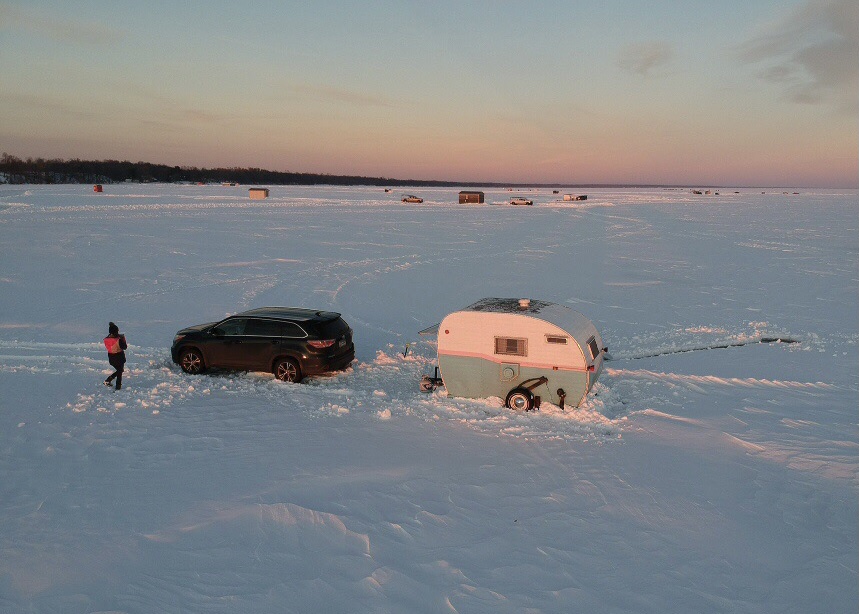RV CAMPING HAS TRANSFORMED the way my family experiences fishing. Gone are the days of booking mediocre hotel rooms so that we can be near our fishing spot when we wake up. And when hotels weren’t an option, I certainly haven’t missed the body aches from sleeping on a hard surface while tent camping.
Now, we can park our camper just steps from our fishing hole for days or weeks at a time. We fish the early morning bite, have lunch, take a catnap, and head back out for the evening bite. We can clean our catch in the kitchen and store fresh walleye fillets in the fridge or freezer – or better yet, cook them on the spot. RVing is a great way to fish as a family, especially because our kids now have a place to nap and play comfortably.
Key Takeaways
- RV camping enhances family fishing trips by offering comfort, convenience, and proximity to fishing spots. Benefits include on-site fish cleaning, food storage, and comfortable rest between outings.
- The ideal fishing RV includes off-grid capabilities, higher clearance for remote locations, a kitchen sink for cleaning fish, pass through storage for rods, and space for watercraft or ice fishing gear – all features that improve functionality and access year-round.
- Specialized RVs, such as toy haulers and ice house campers, provide added versatility for anglers who need to transport equipment or fish in extreme winter conditions. They also make it easier to match your camper to your preferred fishing style.
Table of Contents
ToggleOur Fishing RVs

Our family fishes year-round, and we have a few different pull-behind campers to make that possible. One is a vintage RV primarily used for ice fishing, and the second is a newer camper for regular camping. I’m researching how to convert our newest camper into an ice fish house, too. What can I say? We love fishing. While neither camper has everything I like, they’ve allowed me to figure out what features make the perfect fishing RV. I’ll break down these features below.
Features of a Good Fishing RV
Off-Grid Living

Nowadays, most RVs come with battery and propane hookups. But if you bought an old converted camper like us, you’ll want to know the basic power sources for camping off the grid.
If you can boondock or disperse camp near your fishing spot, make sure you have a big deep-cycle battery with an inverter. If you power anything other than LED lights, you’ll want at least a 100-amp-hour battery and a 1800-watt inverter. We usually run the lights and the water to the pump/toilet when necessary.
When it starts to cool off in the evening, you may want to run the furnace, so make sure you have a full 20-pound propane container and a backup. If propane isn’t an option, a generator can also power an electric heater.
Need new ways to Keep Your Camper Warm?
Higher Clearance

If your secret fishing spot is off the beaten track, you’ll probably be dodging potholes, winding through dirt and gravel roads, or even rolling over snow and ice-covered paths. Look for an RV with raised suspensions, offset wheels, off-road tires, and a roof rack for storing watercraft like canoes and kayaks. There are camping trailers specifically for off-roading, like the Forest River No Boundaries 10.6 – a durable off-road trailer for rougher terrain that can withstand all four seasons.
Truck campers also offer higher clearance since they’re RVs that sit in the bed of pickup trucks, so the clearance depends on what truck you drive. Truck campers can have all the features of a typical travel trailer or fifth wheel, but are often designed for one to two people. They’re compact, self-contained, and can have pop-tops or hard sides.
Want to learn more? Click to find out What Makes an RV Built for Off-Road.
The Kitchen Sink


Images by Jenny Anderson
A kitchen sink makes all the difference in determining whether we eat freshly caught fish for dinner. Most campgrounds and boat launches don’t offer fish cleaning stations, so I usually clean our catch in the RV sink. Cleaning fish can get messy, so having an area where you can fillet and rinse fish with clean water is convenient. Most modern campers have a sink attached to an electric pump with a pressurized water tank, but a sink can be as basic as a manual foot pump that pumps water out of a five-gallon fresh water jug through a spigot, draining into a five-gallon gray water jug.
As our friends Chase and Lindsay of We’re Out N’ About tell us, an outdoor sink for an RV is even better for cleaning fish.
Pass Through Storage

Surprisingly, many RVing anglers store their fishing rods in the shower or on top of their beds. But that can be risky on bumpy roads, especially if you like to travel with hooks already tied to your rods. Pass through storage is the safest and most convenient place for rods. You can mount PVC pipes or a fishing rod storage system to the ceiling of the pass through storage to secure rods in rough road conditions. It’s also a place that’s easily accessible when you’re headed out the door to your next fishing spot.
Are There Different Types of Fish House RVs?
Let’s explore the two main types of fishing RVs: toy haulers and ice houses.
Toy Hauler Fish House

I only recently discovered the convenience of having a toy hauler. It’s a fantastic camper and the best RV for carrying large items. If getting on the water is vital to you, consider a toy hauler for transporting kayaks, canoes, small boats, and other water sports equipment. A toy hauler garage is an enclosed area, sectioned off from sleeper quarters, that keeps watercraft from getting damaged or dirty while on the road.
Ice House RVs for Fishing

If you like to fish year-round like our family, an ice house or a fish house is designed for that exact purpose. It’s an RV that also serves as an ice fishing house, complete with holes in the floor with removable covers, winter-rated insulation, a hydraulic or winch cranks to bring the frame down to the ice, a more powerful heater for those bitter cold days, and all of the amenities you’d find in a typical RV. It’s luxury on ice but can also serve as a camper for spring, summer, and fall.
Other add-on components to convert a fishing RV to an ice house include rattle reels – fishing reels that attach to the walls so that the fishing line goes directly into an ice hole. Our fish house will have a fish camera and monitor this year – a fun addition for the kids (and adults) to watch what’s happening below the ice in real-time. We also store our ice fishing fish finders in one of the cabinets to grab them as soon as our first hole is augered and see if there are fish in that particular location.
An icehouse is sometimes called a fish house, ice shack, ice fishing shack, wheelhouse, darkhouse, or permanent house.


Images by Jenny Anderson
At the end of the day, the perfect fishing RV fits your lifestyle. The only non-negotiables for successful fishing while camping are your rod and reel, line, tackle, bait, and, at times, a bit of luck.
What would you like to see in a fishing RV? Tell us in the comments below.
Author
-

Jenny Anderson is an outdoor content creator, best known as the Girl of 10,000 Lakes. As someone who didn't grow up "outdoorsy," she believes it's never too late to fall in love with the great outdoors. Prior to becoming an outdoor content creator, Anderson was a news anchor and reporter in western Wisconsin. She now uses her passion for storytelling to inspire families of all experience levels to get outdoors. Anderson is a published children's book author and shares her love for nature, fishing, and the outdoor life with her husband, two children, and their yorkie named Kiwi.
View all posts








